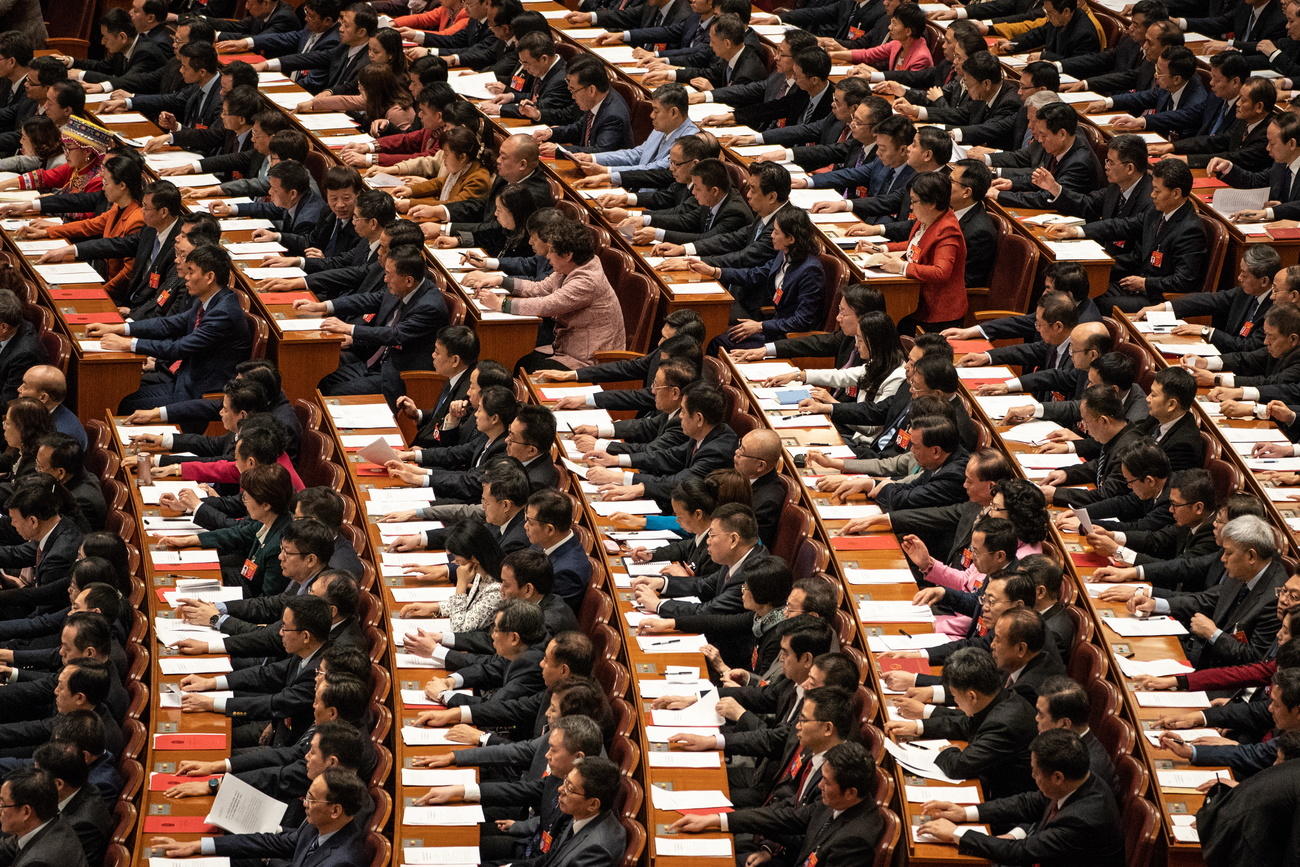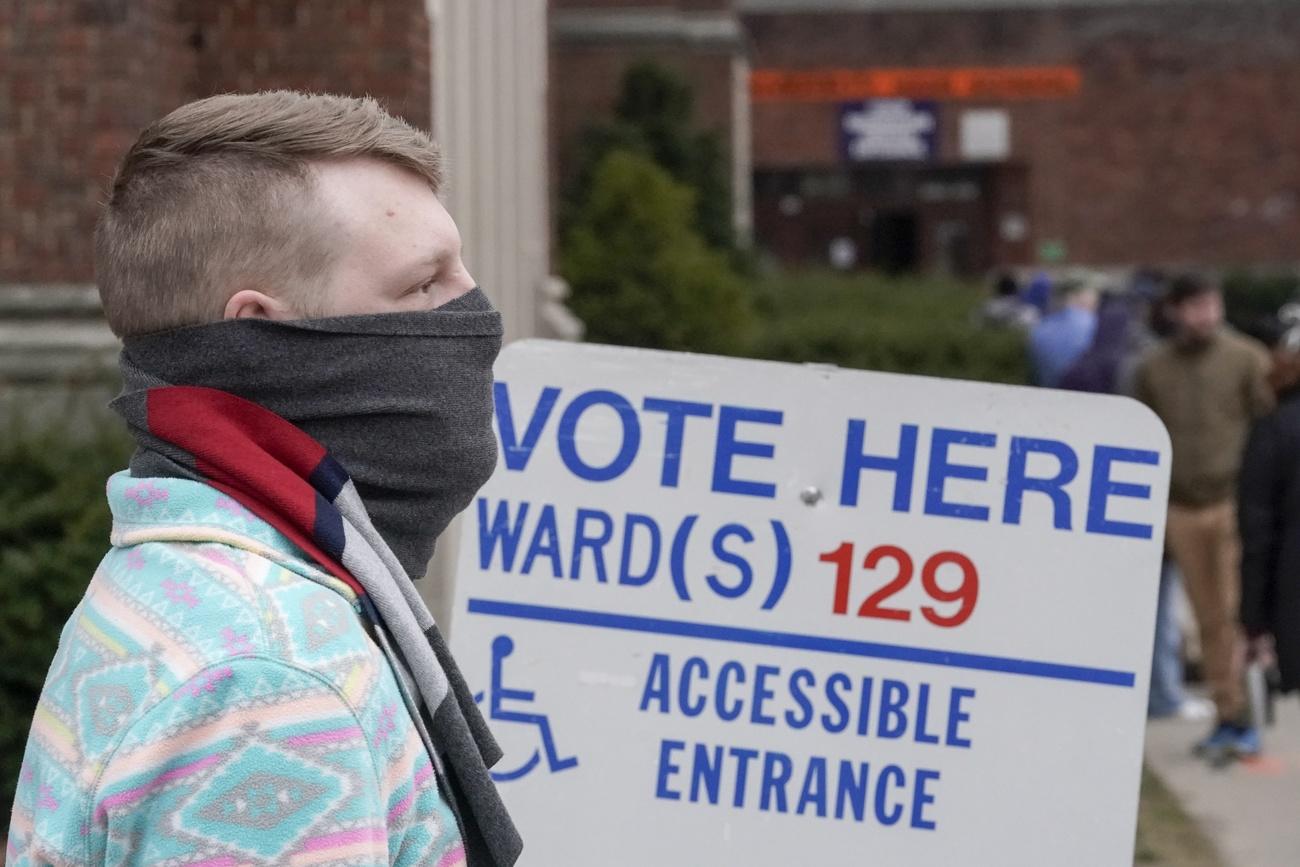Back to a new normal: democracy waking from Covid-19 hibernation

Many parts of the world are cautiously reopening, with politicians heading back to parliament and citizens back to the ballot boxes. But things will not be the same as before.
It’s the biggest elected parliament in the world – China’s National People’s Congress.
The annual gathering of the body (more than one per year is not necessary, due to the limited consultative powers of its 3,000 members and the unfree election process) was cancelled in March due to the pandemic, which began in China’s Hubei province late last year.
But while the pathogen has since travelled the world, creating chaos, lockdown and the biggest economic crisis since the Second World War, the Communist regime in Beijing is now eager to get back to normal.
In this case, the normal is not new: a crackdown on democracy supportersExternal link in semi-autonomous Hong Kong, continuing a strategy of undermining the city’s “Basic Law” agreed in 1997, when Hong Kong was incorporated into China.
In more democratic contexts, however, the eagerness to get back to normal may amount to wishful thinking: the World Health OrganizationExternal link expects the Covid-19 pandemic to last for months, if not years. We are told that we have to learn to live with a global disease to which there is no vaccine, but basic protective rules: physical distancing, handwashing, staying at home, avoiding non-essential travel.

Radical measures like closing borders, schools, restaurants and shops are obviously not sustainable in the long term; neither is the emergency legislation taken by many governments.
And if parliaments are being called back to work – in Switzerland both houses are gathering for a special session next week – many fundamental participatory rights are still on hold for now. But don’t be impatient: the Swiss authorities just announced to hold a super-voting day (on no less than five issues) on September 27: included on the table will be a controversial people’s initiative on immigration and a referendum on the purchase of military fighter jets.
Many democracy reporters, meanwhile – including your newsletter editors – are closely monitoring these developments and exchanging information and observations online.
For example, in North America the non-profit monitoring organization BallotpediaExternal link tracks Covid-19-related democracy developments in the United States day-to-day – and offers insights into the making of hundreds of citizen initiatives and referendums on their way towards decision dayExternal link on November 3.
A similar serviceExternal link is provided by the Asian Network for Free Elections, ANFREL, based in Bangkok, and by Democracy International, headquartered in Cologne, which invites interested people from around the world to become a #CoronaDemocracyReporterExternal link. It also hosts global jam sessions online to discuss the options and challenges of democracy in times of a pandemic: the next one takes place this coming week, on Tuesday, May 5External link.
More measurements
Of course, we also encourage readers to follow our swissinfo democracy reporting. In a recent piece, I assessed the importance of social trust for keeping democratic governance running during the coronavirus. Another of our focuses is looking into the role of modern populism in Switzerland and across the world.
Elsewhere, the latest Bertelsmann Transformation IndexExternal link (one of the most important democracy ranking studies), published on April 28, underlines the fascinating divisions emerging across the world between areas of more and areas of less democracy.
Another key player in the measuring and comparison sector is the Gothenburg-based research group Varieties of Democracy (V-Dem), who presented this week a Pandemic Backsliding Risk IndexExternal link. It calculates an almost even split across the globe: while 48 countries are at risk of democratic decline during the Covid-19 pandemic, some 47 countries are not at risk.
“This proves that responding to the pandemic is possible without jeopardizing democratic standards”, said Anna Lührmann, Deputy Director of V-Dem.
Anna, to whom I talked yesterday, identifies another fascinating democracy trend in times of Corona: “going digital”. Over the past few months we have all learnt to work and connect digitally, with governments, parliaments and citizens all now considering how to establish and develop online platforms for future use.
And while a few countries like Estonia or FinlandExternal link – and the European Union when it comes to the European Citizens InitiativeExternal link – have been leading moves towards digital democracy, in Switzerland skeptical voices have worked to slow this development and even to stop the possibility for Swiss citizens abroad, like myself, to participate in votes online.
It’s probably not just wishful thinking to imagine that this whole debate around e-voting and other forms of digital participation will emerge again soon in light of the experiences we have had during this extraordinary time – not just in Switzerland, but around the world.
Anything more you’d like to hear about in the world of (direct) democracy? Let us know.
Bruno Kaufmann and Domhnall O’Sullivan

More
Coronavirus: the situation in Switzerland

In compliance with the JTI standards
More: SWI swissinfo.ch certified by the Journalism Trust Initiative

You can find an overview of ongoing debates with our journalists here. Please join us!
If you want to start a conversation about a topic raised in this article or want to report factual errors, email us at english@swissinfo.ch.